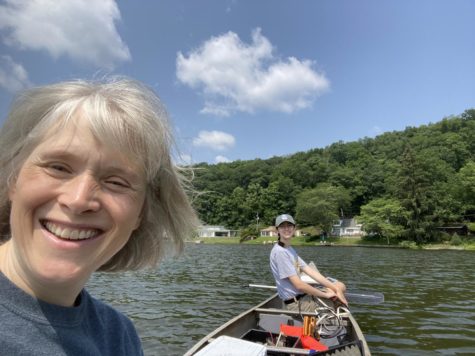Student research continues at Wilkes throughout summer
For most Wilkes students, summer means a break from academics, but for other students, summer is a chance to delve into research under the close direction of professors.
Through the Wilkes Summer Mentoring Grant program, as well as through funding and grants from external organizations, students may assist professors on research projects. Students are paid for their work and sometimes able to receive paid housing on campus.
TQ Smith is a senior computational math and computer science major working with Drs. Del Lucent and Sofya Chepushtanova. Smith explained their research “focuses on using machine learning algorithms and other mathematical techniques to predict how well a drug molecule attaches to a protein based on the 3D representation of the drug molecule and protein.”
Smith’s dedication to the research is apparent, but he also enjoys the opportunity to work one-on-one with professors from different disciplines.

“The best part of my research is the one-on-one mentorship provided by Dr. Lucent and Dr. Chepushtanova,” Smith said. “Both professors take each student under their wing and show them the higher-level uses of their respective discipline. Most importantly, they showed me how to combine the two disciplines in order to study a real world problem of great importance.”
Senior political science and international relations major, Jennifer Boch, is also doing research this summer on two separate projects. One project is focused on shale gas and hydraulic fracturing policies in the United States and Eastern Europe. She is working with Dr. Andreea Maierean.
Boch’s other project is studying the 19th century fashion literary magazine, “Godey’s Lady’s Book,” with Dr. Amy Sopack-Joseph. In this project Boch’s goal is to “discuss the concept of historical memory and how individuals viewed history as it unfolded in this magazine.”
The two projects allow Boch to try out potential career paths.
“The actual work I am doing with my professors is teaching me how to formulate research projects using data collection and gives me practice for other essential research skills,” Boch said. “This experience is invaluable for graduate students and will also give me an edge if I pursue academic or archival career paths.”
While one of Boch’s research projects focuses more broadly on areas of Pennsylvania and Eastern Europe, Sydney Rochette, a senior earth and environmental science major, is doing summer research to benefit the small community of North Lake in Sweet Valley, Pa.
The research, under the direction of Dr. Holly Frederick, started three years ago when a member of the community reached out for help in rehabilitating the health of the lake. This summer, Rochette is specifically studying the water quality parameters and nutrient levels of the lake.
“Our goal in North Lake is to determine if the systems that are set in place to reduce algae growth have made an impact,” Rochette said. “Another goal of our project is to compile all the data in the years since 2018, to see trends over time.”
The goal of monitoring water quality parameters and nutrient levels is completed through periodic trips to North Lake to collect water and sediment samples.
To Rochette the ability to participate in field work is particularly beneficial. “The best part of doing research is getting field experience, especially during Covid where lots of internships are virtual. I really enjoyed my water quality class and wanted to get additional field experience where I could apply what I learned in that class.”
Another environmental engineering student, junior Mel Fotus, is doing research in the Chemistry Department. Fotus is working with Dr. Joshua Bleche on exhaust remediation through plasma-assisted catalysis.
Fotus explained further.
“Primarily, we focus on nitrogen monoxide and we study its behavior with various catalytic surfaces to chemically reduce the nitrogen monoxide into nitrogen dioxide. Our goal is to study the behavior of the molecules to understand the interactions at the plasma-catalyst interface.”
Fotus finds the research interesting and enjoys the hands-on experience, but did face challenges throughout the summer.
“The biggest challenge for me has been learning how to problem solve in the lab,” she said. “Our system encountered quite a few unexpected difficulties over the summer which really stunted some of our progress and prevented us from collecting data for some weeks.”
Despite these challenges Fotus is going to be presenting at the 67th Annual AVS Symposium held in Charlotte, NC in October 2021 and she explains that the experience of collecting data and reporting it at the conference is good preparation for graduate school.
While external grants are common sources of funding for summer projects, Annie Kline, the financial manager for the Summer Mentoring grants, explained that Wilkes employs 50 students and has granted 22 faculty members funding for projects this summer.
“The Mentoring grant is a wonderful experience for students to get hands-on experience in areas of study and personal interest,” Kline added.
Smith’s summer research experience embodies Kline’s claim.
“When I was younger, I never really imagined myself as any sort of scientist, but I always wanted to get up in the morning, go to a dedicated place for work, and study something that I was passionate about,” Smith said. “I thought that I would have to wait years before I could do anything like that. Working for Dr. Lucent and Dr. Chepushtanova allowed me to do exactly that.”